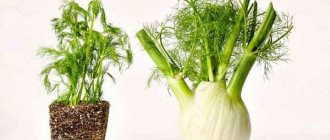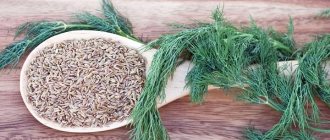The birth of a child in a family is not only a great joy for parents, but also a huge responsibility for this restless bundle of happiness. With newborn children, there are initially many problems: from the parents’ inability to handle their firstborn to serious problems with the baby’s health. We sincerely wish you not to know the latter, but the former comes with experience. With each new day spent with your baby, you will feel more confident, and the fear of doing something wrong will gradually go away.
The crying of a child becomes an alarming signal for parents. Since a newborn cannot express his thoughts and desires in words, he will demand something by crying. If you are sure that the baby is fed, has a clean diaper, and is neither cold nor hot, then most likely he is suffering from colic. The problem is unpleasant for adults and very painful for the baby, who may burst into tears during such attacks. Don't ignore! It is in your power to help your child.
Colic problem

Most problems can be eliminated by observing the necessary care for the newborn, proper feeding, etc. With colic, a baby can scream for 2-3 hours and parents are powerless to help the baby. Colic usually begins in the third week of life, most often in the evenings or after feeding. Due to the immaturity of the baby's gastrointestinal tract, gases accumulate in the intestines, which cause painful cramps, bloating, and discomfort. This condition can last up to three months. Colic is considered a normal physiological condition for a newborn and treatment, as a rule, is not required, but you can try to alleviate the pain of the child. Dill water has long been used as a simple and effective medicine to combat intestinal colic.
Colic in a child: causes
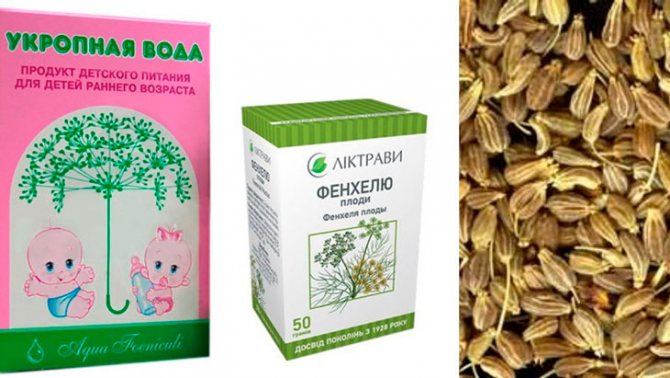
This discomfort stops after 6 months of life. By this time, the gastrointestinal tract is progressing and functioning normally. Babies cry for many reasons. They don’t know how to speak yet, so mom can only guess why the “alarm” went off. Let us give examples of the behavior of a newborn, by which it is possible to determine the preface of cramps in the intestines:
- pressing the legs towards the tummy;
- prolonged crying;
- redness of the body.
The same reaction occurs with an adult. For example, let’s take a situation from the life of an adult. Let's go on vacation abroad. The cuisine of other nations differs from our native dishes and our stomach does not always accept exotic delicacies “with a smile.”
Painful sensations appear in the abdomen, gas formation, and diarrhea occur. In such an environment, we lie down on the bed and tuck our legs in order to alleviate the pain. The baby does the same.
Redness during the period of spasms occurs as a result of body tension, and crying in the first days of life is an exceptional language in which the baby can express indignation and notify about the task.
To alleviate the torment, the newborn is given medication to relieve bloating and gas.
But this is very undesirable, because the baby’s immunity is just beginning to progress, and we are already inhibiting natural processes with medicine.
A child fed with pills from birth will grow up weak and often get sick. A real medicine – dill water – will help you preserve your precious health.
The benefits of dill and dill water
Dill water is a tincture made from the seeds of dill (fennel) or dill. Dill and fennel are cultivated everywhere and are widely used both in cooking and as medicinal herbs. The seeds of these plants have many beneficial properties, due to which they are often used in medicine:
- Relieves spasm of intestinal smooth muscles during colic and flatulence;
- Promotes the removal of gases accumulated in the intestines;
- Improve the functioning of the gastrointestinal tract, help form the necessary intestinal microflora;
- Have a diuretic effect;
- Increase lactation;
- They are antiviral and bactericidal;
- Help relieve inflammation;
- It thins mucus when coughing and cleanses the bronchi well;
- Have a positive effect on the nervous system and have a sedative effect;
- Lower cholesterol levels;
- Dilate blood vessels;
- Improves heart function;
- Essential oils obtained from the seeds of these plants are widely used in cosmetology and perfumery.

Contraindications to the use of dill and fennel seeds may be individual intolerance and hypotension.
Contraindications
Contraindications to the use of dill water are rare, but they do occur. There are two main reasons for not using it: individual intolerance, that is, increased sensitivity to fennel and drugs based on it, and allergic reactions. Dill water is contraindicated for children who have been diagnosed with postpartum jaundice, and for children with diseases of the gallbladder and biliary tract. During treatment, it is necessary to closely monitor the child’s condition and promptly note any symptoms that cause concern:
- Redness, peeling of the skin, itching, rash;
- Nasal discharge, swelling of the mucous membrane, difficulty breathing;
- Diarrhea, nausea.
Any of the listed signs serves as a signal to stop taking dill water.
Dill water from the pharmacy
Quite often, doctors prescribe this remedy for children, but it is difficult to find dill water in a pharmacy. For preparation, the pharmacy uses the following recipe: add 0.05 grams of fennel oil per liter of water. The prepared solution can be stored for about 30 days, so it is rarely sold and only in pharmacies with a prescription department, where medications are directly prepared. Pharmacy chains may offer special fennel-based products, for example, Plantex or instant children's tea with fennel. Such drugs can also be used following the instructions.

This drug has already been tested by many mothers and helps many babies well.
Now it has risen significantly in price and costs about 300 rubles (pack of 10 bags).
How to prepare dill water at home (video)
If there is no suitable pharmacy nearby, you can prepare an infusion of dill seeds yourself. How to properly prepare dill water for a newborn at home:
- Mix 1 teaspoon of crushed seeds and a glass of boiling water.
- Wrap and leave for 30-40 minutes.
- Strain the resulting infusion and bring to the desired temperature.
The composition is not intended for long-term storage, and it must be prepared fresh every day. It is better to purchase dill or fennel seeds at the pharmacy.
Maintaining good hygiene will make your baby feel more comfortable, which means you will have less to worry about. Our next material is about the rules of hygiene for newborn girls.
Grass selection
When preparing dill water yourself, it is especially important to choose the right herbs:
- The stem and leaves should not be limp.
- The end of the stem should be elastic.
- Plants with sticky dark green leaves are not suitable for use.
- An unpleasant odor indicates the beginning of rotting processes.
- The leaves and stem should not be yellowed.
Fresh greens can be stored at room temperature for up to 3 days with the leaves dipped in water.
READ ALSO: Treatment with oats at home: how to brew and drink correctly?
The shelf life increases to 7 days if the plant is stored in the refrigerator - in the vegetable department.
Dill can be prepared for the winter by first drying the greens in the shade in the fresh air.
Dill seeds can be stored in a cotton bag or glass jar.
Mode of application

Now let's answer a common question - how to give dill water to a newborn? The decoction should be given to the baby before meals. The dosage is selected based on the age and weight of the baby; very often young mothers ask how much water can be given to the baby. You need to start little by little with a teaspoon 3 times a day. After making sure that the baby tolerates dill water well, you can increase the dose to several spoons 5-6 times a day. Ingoda kids don’t like the taste of the infusion, and they don’t want to drink it. In this case, you can mix some water with a small amount of breast milk or formula and feed the baby with a spoon.
Before giving dill water to your baby, consult your pediatrician to be sure that he is suffering from intestinal colic. Even such a harmless medicine should be used only when necessary.
Do you know what a 1 month old newborn baby should be able to do?
How to notice possible problems and developmental delays in time?
Pay attention to the material - how often a newborn should poop. This is important information for all young mothers.
Beneficial features
The dill-based product has many unique actions:
- Reduces and relaxes spasms of intestinal smooth muscles.
- Promotes the development of a favorable microscopic environment in the body.
- Normalizes sleep and prevents insomnia.
- Reduces pressure on the intestinal walls.
- Dilates blood vessels.
- Has a beneficial effect on the central nervous system.
- It has a calming effect (read about calming herbs here).
- Has an antibacterial effect.
- Removes phlegm when coughing.
- Helps improve blood delivery to all systems and organs.
- Eliminates inflammatory processes in the body.
- Has a diuretic effect.
- Improves the functioning of the respiratory system.
- Normalizes cardiac function.
- Promotes the removal of bile from the body (list of choleretic herbs).
- Improves appetite.
- Serves as a means of preventing constipation.
- Has a positive effect on kidney activity.
- Promotes healing of wounds and ulcers.
Drinking dill water helps improve mother's lactation, has a mild calming effect and normalizes digestion.
Half a glass of the product, taken 30 minutes before feeding, will increase the production of breast milk and improve its composition for better absorption of nutrition by the baby.
However, you should know that dill seeds are contraindicated if you have low blood pressure.
If an excessive amount of dill is used, loss of strength, blurred vision and fainting may occur.
Dill water helps remove gases in babies due to the ability to relieve spasms of the intestinal muscles.
Do you know how to take royal jelly in granules, the medicinal properties of which are described in the current article? Click on the link and read the instructions.
Read about the beneficial properties of fireweed for women here.
On the page: https://netlekarstvam.com/narodnye-sredstva/lekarstvennye-rasteniya/zhenshen.html it is written about the use of ginseng root tincture.
With regular use, the child’s digestion improves and reduces the risk of pain in the tummy.
READ ALSO: Pumpkin juice: benefits and harms, preparation at home
Remember! When symptoms appear accompanied by:
- intestinal colic with additional digestive disorders,
- diarrhea or constipation,
- increased body temperature,
- loss of appetite
- the appearance of impurities in the stool of a greenish tint,
- bloating,
It is recommended to consult a pediatrician.
Before using dill water, you need to make sure that it is intestinal colic that is bothering your baby.
Using dill water for nursing mothers
Dill water is useful not only for children, but also for mothers. It will help increase lactation and improve intestinal function, which can be very important for young mothers.

During breastfeeding, if there is a need to increase lactation, you can use a dill infusion prepared with a tablespoon of seeds in a glass of boiling water. You need to take the resulting infusion either twice a day, half a glass, or a tablespoon 6-8 times a day. You need to drink in small sips, holding it in your mouth for a short time.
You can use dill for colds and inflammation, even while breastfeeding. Also use dill water for rejuvenation as a lotion or compresses.
Dill seeds will also help with swelling and fatigue of the eyes, and decreased vision. To do this, make a compress of gauze soaked in dill water and apply it to the eyes for 20 minutes. This compress will help smooth out wrinkles.
It is not recommended to use dill water at low blood pressure.
Dill water for a newborn at home
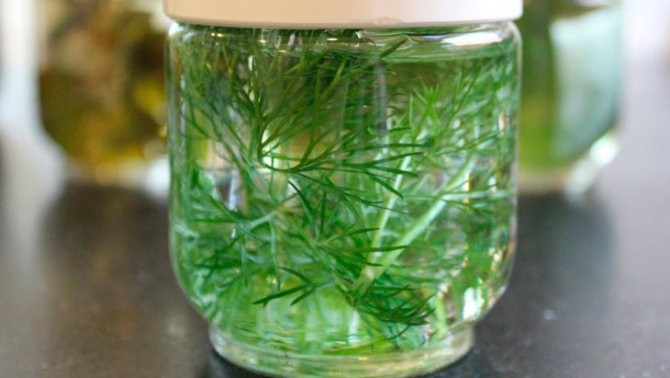
What kind of drug is this and what is it made from? Dill water is made from the ether of fennel seeds. This plant is popularly known as pharmaceutical dill. It is difficult to obtain such a product in liquid form. It is produced only in pharmacies with a valid prescription department. Pharmacists prepare the medicine on the spot according to the prescription using real ingredients. You can replace dill liquid with a safe medicinal product made from fennel seeds.
The medicine is available in powder form and is called “Plantex”. In addition, preparing a healing decoction at home from the seeds of the dill herb is encouraged.
What are the benefits of dill?
This fragrant herb is used by chefs as a seasoning for dishes. The plant is beneficial for adults and children.
Women during breastfeeding should eat dill seeds or drink infusions from umbrellas.
This will help rid yourself and your newborn of gases, increase lactation and restore health.
The miracle herb is suitable for the stomach, genitourinary system, gall bladder, kidneys, and liver. It contains many vitamins and useful microelements. It is literally a “bag of health.”
What else is useful for healing water from seeds:
- reduces gas formation;
- relieves symptoms of colds;
- expectorant;
- heals the liver and gall bladder;
- treats gastritis with low acidity;
- heals diseases of the genitourinary system, kidneys;
- relieves constipation;
- improves intestinal motility;
- relieves anxiety, normalizes sleep;
- normalizes mental tempo;
- regulates pressure.
If you take the infusion regularly, you will get rid of many problems in the body. Dill water for a newborn for colic is not difficult to prepare.
The main thing is to stock up on seeds and dried herbs for the winter. Let's look at two methods of preparing dill water for newborns - seed and herbal.
Dill water for a newborn: preparation
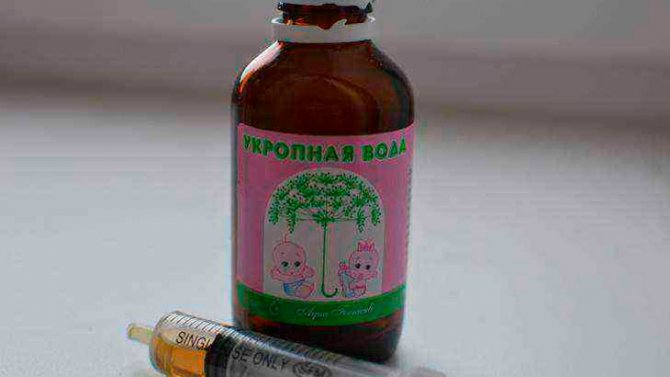
For the seed method we use dill seeds. The recipe for making dill water at home is very simple:
- Pour one spoon of crushed dill seeds into a glass;
- pour 200 ml. hot water;
- leave for 45 minutes to one hour;
- filter.
This composition should be added to expressed milk or infant formula, no more than one teaspoon, and given to the child.
For very young babies, from two weeks to a month, you need to drip 15 drops onto the tongue. This dill water can be stored for only a day. If fennel is not found, you can prepare dill liquid from essential oil.
To do this, dissolve 0.05 mg of ether in a liter of boiled water. Store in the refrigerator, covered, and use within 3 days. If there are no seeds, you can brew healing tea from dried or fresh dill. For the tincture, take a teaspoon of herbs and half a glass of boiling water, leave for 45 minutes and strain.
How to give dill water to a newborn

The decoction should be given before eating, measuring the required amount with a spoon. If your baby refuses to take water, make it taste familiar - mix it with expressed breast milk. How much dill liquid is required for one day. At first, the dosage should consist of three teaspoons. If the body typically accepts drinking, increase the dose to 6 spoons. The decoction must be given before meals.
Since infants are fed every 2-3 hours, it is necessary to distribute the medication at identical intervals between feedings. How often can you give dill water to a newborn? It depends on the individual characteristics of the baby.
Monitor your baby's health condition carefully. If the remedy works correctly, give it 6 times a day, dividing evenly between feedings. Do not give your baby the decoction as an additional drink. Fennel can cause allergies.

